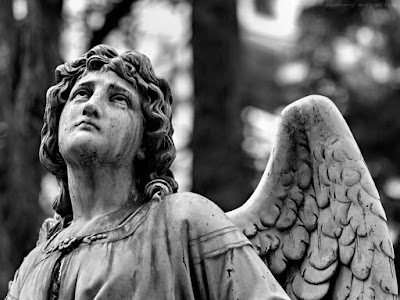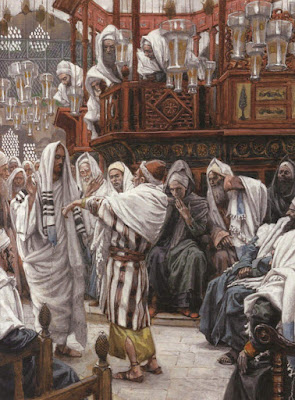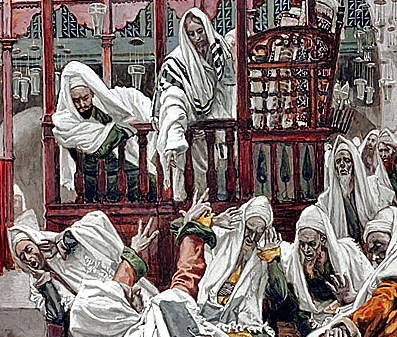Here are some basics about the author of the book of Mark along with excerpts of global commentary from Vincent's Word Studies.
His name was
John Mark. He was the son of Mary, cousin of Barnabus, and close friend of Peter.
We know from Acts 12 that he was the son of a wealthy woman in whose house the early church met. And from Peter's reference to him as his son in the faith (1 Peter 5), it would seem as though Peter was influential in John Mark's conversion. If this be so, it would make Mark's Gospel actually Peter's Gospel—for it would have been Peter who informed Mark of the events contained therein. Thus, scholars believe they are hearing the words and feeling the heart of Peter as they study the Gospel of Mark.-Jon Courson
"Matthew, Luke, and John each had a particular lens, a framework of purpose, through which they presented the events of Jesus' life. Mark is a documentarian, quickly serializing events. Because of this style, many think he was compiling the oral testimony of Peter.
Several features make Mark’s Gospel unique among the Gospels. First, it emphasizes Jesus’ actions more than His teaching. Mark recorded 18 of Jesus’ miracles but only four of His parables." -Bible Knowledge Commentary
"Mark is the shortest of the four Gospels. From the 4th till the 19th centuries it was largely neglected by scholars because it was commonly regarded as an abridgment of Matthew. But by the end of the 19th century the theory that Mark was the first Gospel written gained widespread acceptance. Since then Mark has been the object of intense interest and study." -BKC
"He was a Jewish Christian who lived in Jerusalem with Mary his mother during the early days of the church. Nothing is known about his father.
A “Gospel” was a unique literary form in the first century. It was not simply a biography of Jesus’ life, a chronicle of His “mighty deeds,” or a set of reminiscences by His followers, though it contains elements of all these. Rather it is a
theological proclamation to a particular audience of God’s “good news” centered in the historical events of Jesus’ life, death, and resurrection. In line with his purpose Mark arranged and adapted the historical material he acquired from his sources.
*******************
3/28/2020 Thoughts--Interesting to re-read these comments. Mark, son of a wealthy woman named Mary. Probably a strong friend and follower of Peter, so "Peter's gospel" in a sense. The concept of a gospel as a unique literary genre. All good food for thought.
New?
Notes from Wikipedia:
Unique in these ways 1) no genealogy of Jesus 2) no post-resurrection appearance in original text
Jesus "heroic man of action" I would say that's in keeping with his character. He was a man that moved around fearlessly but thoughtfully.
He keeps his identity secret "Messianic Secret"
Date: 65-75 AD
Audience--gentile
probably written in the time of Nero's persecution.
Some scholars see the author as anonymous--they see it as a collection of things in early circulation.
Most scholars accept that the passion narrative is as early as 40 AD
Most scholars accept that Luke & Matthew use Mark as a reference, grounding point. These two gospels agree with each other
when they agree with Mark
William Wrede was an early 20th century theologian from Germany. He's remembered for developing the theory of the "Messianic Secret." He suggested that this was a literary and apologetic device by which early Christians could explain away the absence of any clear claim to be the Messiah, primarily with regard to the book of Mark.
What happened on Easter?: Bible scholar Bart Ehrman's new theory Interview by Ruth Graham
Graham, Ruth.Boston Globe; Boston, Mass. [Boston, Mass]20 Apr 2014: K.1.
Bart Ehrman---agnostic historical scholar---argues that Jesus didn't claim to be the son of God in Matthew, Mark or Luke.
Interesting thought:
How do you solve a problem like the Bible?: Bart D Ehrman admires a study of how this mysterious book was put together - and the strangeness that resulted
The Daily Telegraph; London (UK) [London (UK)]06 Apr 2019: 22.
"The Bible's authority does not reside in a fundamentalist claim that it is literally inspired by God and inerrant, but in its inestimable value for the faithful. It stands at the bedrock of the ever-living and developing Jewish and Christian traditions, and is in constant relationship with them..
The Bible can help committed readers reflect on the beliefs and keen insights of the ancient generations in their tradition, authors who, thousands of years ago, thought deeply on issues of life and death. In that way, Scripture helps people understand themselves in relation to their lives, their world, and the divine being whom they believe stands above it. The Bible should be a guide, not a dictator." -Ehrman
Worth thinking about--I do think the traditional conservative "inerrant" perspective can be limiting or see anti-thoughtful in some regards. However, I don't think he proposes a better perspective. That we follow and interpret these "traditions" in ways that are relevant to our modern culture sounds very subjective and loose. I especially dislike his last statement above 'The Bible should be a guide, not a dictator."
I think we need to recognize that in some sense, all books are a truth a person expresses as best they are able. I see no reason why God could not and would not inspire the writers of the Bible to express God's thoughts and will--not a "guide" but a truth.
************************ excerpts******************************
"Unlike the other gospels, Mark's narrative is not subordinated to the working out of any one idea. Matthew's memoirs turn on the relation of Christ to the law and the prophets. He throws a bridge from the old economy to the new. His is the Gospel as related to the past, the Gospel of Christianity regarded as the fulfilment of Judaism. Luke exhibits Jesus as a Saviour, and expounds the freeness and universality of the Gospel, and the sacredness of humanity. John wrote that then might believe that Jesus is the Christ, and might have life in him. While Matthew and Luke deal with his offices, John deals with his person. John carries forward the piers of Matthew's bridge toward that perfected heavenly economy of which his Apocalypse reveals glimpses. In Matthew Jesus is the Messiah; in John, the Eternal Word. In Matthew he is the fulfiller of the law; in John he foreshadows the grander and richer economy of the Spirit.
"Mark, on the other hand, is a chronicler rather than a historian. His narrative is the record of an observer, dealing with the facts of Christ's life without reference to any dominant conception of his person or office. Christ's portrait is drawn “in the clearness of his present energy;” not as the fulfilment of the past, as by Matthew, nor as the foundation of the future, as by John. His object is to portray Jesus in his daily life, “in the awe-inspiring grandeur of his human personality, as a man who was also the Incarnate, the wonder-working Son of God.” Hence his first words are the appropriate keynote of his Gospel: “The beginning of the Gospel of Jesus Christ, the Son of God.”"-Vincent's Word Studies
"The traces of Peter's quick perception and dramatic and picturesque power are everywhere visible in Mark. While Matthew fully records the discourses of our Lord, Mark pictures his deeds.
“Mark does not wear the flowing robes of Matthew. His dress is 'for speed succinct.' Swift-paced, incisive, his narrative proceeds straight to the goal, like a Roman soldier on his march to battle.” Mark's is, therefore, pre-eminently the pictorial Gospel: the Gospel of detail.
The word νόμος, law, never occurs in Mark nor in Peter.
Mark is peculiarly minute and specific as to details of persons, times, numbers, and places; a feature in which, also, he resembles Peter .
But Mark does not confine himself to mere outward details. He abounds in strokes which bring out the feeling of his characters. He uses six different words expressive of fear, wonder, trouble, amazement, extreme astonishment.
I have described the characteristics of Mark at some length, because they lie peculiarly in the line of the special purpose of this book, which deals with individual words and phrases, and with peculiarities of diction, rather than with the exegesis of passages. Of this Gospel it is especially true that its peculiar flavor and quality cannot be caught without careful verbal study." -Vincent's Word Studies
******************************************
What is "the Messianic Secret" theory especially with regard to Mark?
William Wrede originated the theory in 1901
"Part of Wrede's theory involved statements in the New Testament by Jesus to demons who recognize his divine nature as well as to his followers not to reveal to others that he is the Messiah. Wrede suggested that this theme was not historical
but was an addition by the author of Mark. Wrede's broad concept of the Messianic Secret also involved the use of parables by Jesus." -Wikipedia
So did Wrede not believe in the inspiration of the scriptures? If he thinks Mark manipulated/added a spin on it?
demons recognized him.
parables hid truths--yes--but about his nature as son of God?
Wrede's theory was associated with Marcan priority. Marcan priority is the thought that Mark was written first. However, later Wrede realized that his theory doesn't work as well if Mark is written first, but would work better if it wasn't. Those that ascribe to his theory though "were forced" to accept the need for Mark to be written first later on.
So I'm confused about how it could be advantageous for Wrede to think it better if Mark not written first but his later followers "were forced" to concede this. Yet they are criticized for it? It suggests it is a hole in the theory.
This part sounds especially dumb:
"The literary explanation theory has it that Mark made a conscious effort to identify Jesus with Odysseus, a Greek hero with whom Mark's gentile audience would certainly have been familiar. Odysseus, on his return home, has to disguise his identity to avoid his enemies, and in Mark the messianic secret could serve the same purpose for Jesus."
*****************************
3/30/2020
This morning I'm reading an academic article that focuses on the narrative technique of Mark. Here is one statement about narration I find helpful:
"The relationship of point of view and the experience of a reader is explained by Resseguie: ‘In
apprehending narrative point of view, the reader discovers the norms, values, beliefs and general
worldview that the narrator wants the reader to adopt or reject’ (Resseguie 2005:167).
Motifs: allegiance
narrator adopts a point of view, and indicates through Old
Testament quotations that it is a consistent point of view
with Scripture, and has God appear in the narrative to
bolster and reaffirm this point of view, there seems little
doubt that the implied reader is invited to affirm and agree.
 “Blessed are those who are persecuted for righteousness' sake, for theirs is the kingdom of heaven. Blessed are you when others revile you and persecute you and utter all kinds of evil against you falsely on my account. Rejoice and be glad, for your reward is great in heaven, for so they persecuted the prophets who were before you. -Matthew 5:10-12
“Blessed are those who are persecuted for righteousness' sake, for theirs is the kingdom of heaven. Blessed are you when others revile you and persecute you and utter all kinds of evil against you falsely on my account. Rejoice and be glad, for your reward is great in heaven, for so they persecuted the prophets who were before you. -Matthew 5:10-12


















